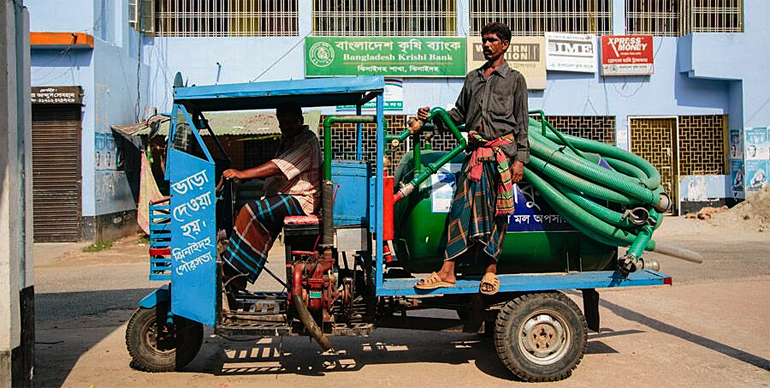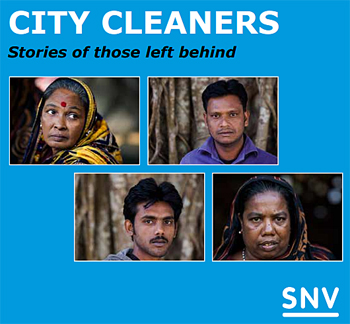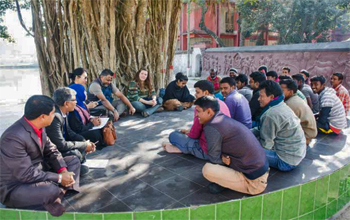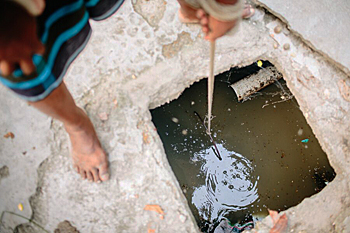SNV takes a stand against poor circumstances septic tank emptiers in Bangladesh
 Ninety percent of all septic tanks in Bangladesh are emptied manually creating severe health issues for cleaners. This reports the Dutch aid organisation SNV in a recently published magazine that shows the daily life of emptiers of pit and septic tanks in the cities of Khulna, Kushtia and Jhenaidah in Bangladesh.
Ninety percent of all septic tanks in Bangladesh are emptied manually creating severe health issues for cleaners. This reports the Dutch aid organisation SNV in a recently published magazine that shows the daily life of emptiers of pit and septic tanks in the cities of Khulna, Kushtia and Jhenaidah in Bangladesh.
SNV supports a programme to improve the faecal sludge management (FSM) by piloting new strategies and improve the working circumstances.
 Better work opportunities
Better work opportunities
The magazine ‘City cleaners - stories of those left behind’ tells about the emptiers that are mainly poor workers from the low caste Harijan community. They do their sanitation work under very poor circumstances.
In the magazine the emptiers tell about their dream of better work opportunities and a safer future for their loved ones. It showcases some of their stories, giving insight into the hardships of those often left behind.
Underpaid services
In Bangladesh most of septic tanks and pits are directly connected to the drain or open water bodies. Therefore they are never emptied. Of the remainder, more than 90 percent are still emptied manually.
Accordingly, over a 10-month period in 2015 alone, 31 reported deaths of pit emptiers in work-related accidents took place in Southern Bangladesh, ‘while even more deaths go unreported’.
Those who work for city corporations and other government agencies receive just 15 US dollar per month, a rate that has not increased in the past five years.
Meanwhile, as there is no set rate for freelance pit and septic tank emptying services, the price is generally agreed between the emptier and the service recipient, causing such work often to be undervalued and underpaid.
 Organising meetings to strengthen the network amongst the empiters is a major activity of the FSM-programme.
Organising meetings to strengthen the network amongst the empiters is a major activity of the FSM-programme.
Improvements
Mayor Md. Moniruzzaman of Khulna explains what has been achieved to improve the working conditions of the emptiers. ‘Before SNV came or the start of the FSM programme, we didn’t have any plans for people who were involved in emptying and cleaning pits and septic tanks.’
‘Here in Khulna’, the mayor continues, ‘we had traditional ways of cleaning septic tanks. They clean the city, clean the homes or campuses, and they do this on their own terms. We do have cleaning departments who have certain responsibilities, but proper faecal sludge management is a new concept to us.’
‘Things are now coming into shape. We are aware of their needs; they are being involved in projects, and are getting trained properly’, says Moniruzzaman.
 Basic knowledge on health
Basic knowledge on health
Although there is an awareness for the faecal sludge services to transform from manual to mechanised, the magazine also emphasise the need to provide septic tank emptiers with basic knowledge on health and sanitation standards.
‘For their own safety, pit and septic tank emptiers and cleaners need to start wearing gloves’, says Md Saidul Karim Mintu, Mayor of Jhenaidah.
‘Yes, it might not be comfortable for them in the beginning. Even doctors would find it tricky to operate with gloves at the beginning.’
The publication of the magazine is part of SNV’s programme ‘Demonstration of pro-poor market-based solutions for faecal sludge management in urban centres of Southern Bangladesh’ programme.
Download here a copy of City cleaners - stories of those left behind (as a pdf-file).
Read also on this website
● Stockholm World Water Week 2016: Taking sanitation to the next level, 31 August 2016
● Stockholm World Water Week 2015: Let’s accelerate WASH, let’s do it differently, 27 August 2015
● SNV supports skill training on total sanitation to reduce open defecation in Lao PDR, 23 December 2013
● Country: Bangladesh
More information
SNV World
The Hague, the Netherlands
+31 70 3440 244
www.snv.org



